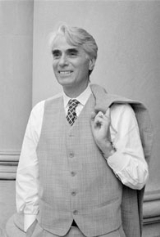
political philosopher
, most prominent in the 1970s and 1980s. He was a professor at Harvard University
. He is best known for his book Anarchy, State, and Utopia
(1974), a right-libertarian answer to John Rawls
's A Theory of Justice
(1971). His other work involved decision theory
and epistemology.
Nozick was born in Brooklyn
, the son of a Jewish entrepreneur from the Russian shtetl
who had been born with the name of Cohen.
When I was 15 years old, or 16, I carried around on the streets of Brooklyn a paperback copy of Plato's Republic, front cover facing outward. I had read only some of it and understood less, but I was excited by it and knew it was something wonderful.![]()
Individuals have rights and there are things no person or group may do to them [without violating their rights].
![]()
There is no social entity with a good that undergoes some sacrifice for its own good. There are only individual people, different individual people, with their own individual lives. Using one of these people for the benefit of others, uses him and benefits the others. Nothing more.
![]()
From each as they choose, to each as they are chosen.
![]()
Whoever makes something having bought or contracted for all other held resources used in the process (transferring some of his holdings for these cooperating factors), is entitled to it. The situation is not one of something’s getting made, and there being an open question of who is to get it. Things come into the world already attached to people having entitlements over them.
![]()
Is there really someone who, searching for a group of wise and sensitive persons to regulate him for his own good, would choose that group of people that constitute the membership of both houses of Congress?
![]()
Taxation of earnings from labor is on a par with forced labor. Seizing the results of someone's labor is equivalent to seizing hours from him and directing him to carry on various activities.
![]()

